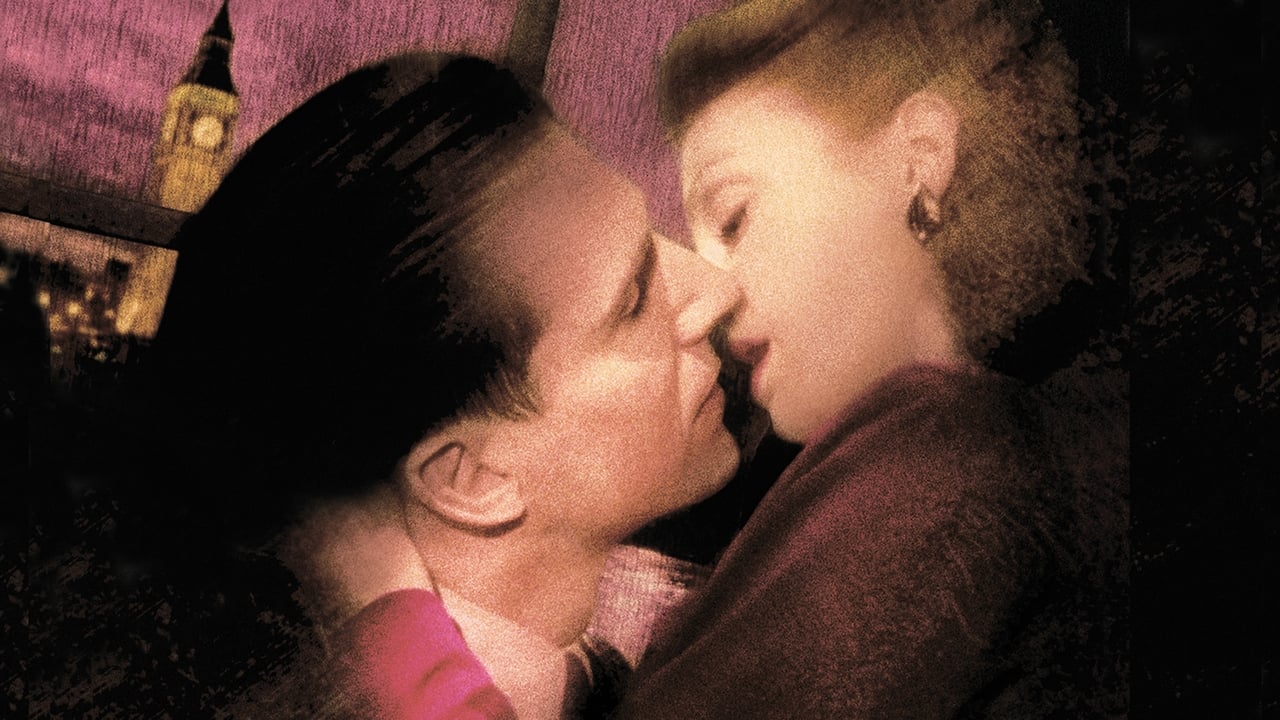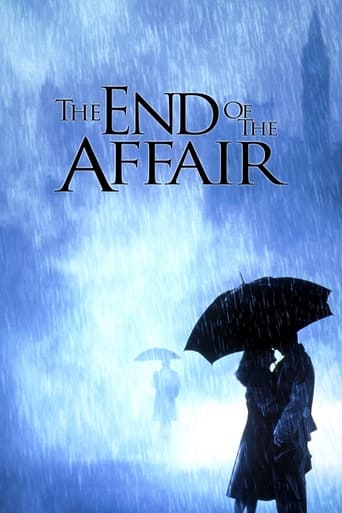



i know i wasted 90 mins of my life.
Disapointment
I was totally surprised at how great this film.You could feel your paranoia rise as the film went on and as you gradually learned the details of the real situation.
View MoreFun premise, good actors, bad writing. This film seemed to have potential at the beginning but it quickly devolves into a trite action film. Ultimately it's very boring.
View MoreThis film is the type of period romance film I dislike. It's all so sad and emotional, with the loud overbearing score intended to make you truly feel. It's all obnoxious. The performance are good enough, but none of them resonate that strongly because of the very pat direction and the incredibly vapid writing. It's all so clichéd, it's the reason these sort of films don't age very well and the reason why many (like me) don't look forward to them. I'm surprised Moore got a nomination for this, she's just not up to par for the Oscars. Easily her weakest nomination. I can't say I recommend this at all, it's just not up to very high standards and not very entertaining.
View MoreThe narration begins and ends with one of the three main characters in the adaptation of Graham Greene's novel of the same name - Up-and-coming novelist Maurice Bendrix (Ralph Fiennes). It is his 'diary of hate'. The 'diary' began in 1946 London on a rainy night where he had a chance encounter with important civil servant Henry Miles (Stephen Rea), the husband of his ex-mistress Sarah (Julianne Moore).As the film progresses with Miles telling Bendrix of his suspicions of his wife Sarah having an affair, so do the audiences beginning to see the early flashbacks of Bendrix and Sarah having their affair amidst the backdrop of during the Second World War as well. The two first met at a party and began to fell in love quickly. Coming back to the present, Bendrix hired Parkis (Ian Hart), who uses his young birthmarked son Lance (Sam Bould) to investigate. In Parkis's early investigations, Bendrix learns that Sarah has been making regular visits to a priest in the name of Father Richard Smythe (Jason Isaacs), under the guise of dental visits.What happened in the flashbacks is a stark contrast to the present where Sarah has been cold towards her former lover Bendrix when they met up and talked about her husband. Because in the flashbacks, Bendrix is expressing jealously at Henry and asking Sarah to leave her husband. And though the two did expressed their love for their each other, the whole affair ended abruptly during the Blitz when a bomb explodes near where Bendrix is residing as he is out of the hallway. He fell down from the staircase and was being awoken later, not seriously hurt but was bloodied. When he went back upstairs, Sarah is shocked to discover that he is still alive. Bendrix took her reaction in the wrong way and left, but not before telling him that "Love doesn't end, just because we don't see each other." Coming back to the present again, Parkis has managed to obtain Sarah's diary and passes it to Bendrix. The diary would come to show the affair from her viewpoint, including what really happened when the bomb exploded near Bendrix's residence. She had been trying to revive him and when she assumed that he could not make it, she went back to the room and prayed for Bendrix's life. Just as she was doing so, Bendrix appeared. After learning the full story which also included what happened to Sarah after the war ended through her diary, Bendrix begs Sarah to reconsider their relationship.Around the same time, Henry (who would come to rue his inadequacies as a lover to his wife Sarah) had figured out the relationship between his wife and Bendrix, asks Sarah not to leave him. But Bendrix's persuasion held sway and she spent a weekend with him. Henry did manages to track the couple down, informing Bendrix that Sarah has actually being contracting a terminal illness all along.It may be morally wrong, but it is admirable from Sarah's part in terms of being strangely faithful to the two men in her life in her amicable but dour husband Henry and the lover she cannot have in Bendrix. But as well, the two crucial 'promises' she has ever made in her life. As the film went on, one also get to discover that despite being obsessively in love with Sarah, Bendrix discovers that he actually knew very little about her. While Sarah does not need the sight of God to love him, Bendrix blames the Almighty on taking Sarah away from him.It is quite a concept of telling the story of having flashbacks and switching to the present at times, as the audience get to see the full story as the film unravels. Apart the main characters, the minor ones played their role as well, in the form of Ian Hart as the investigator Parkis and the young boy who played his son.
View MoreThere are faces that cameras like. Ralph Fiennes, for example, in any movie you watch him, whether he is a psycho killer ("Red Dragon") or Voldemort himself ("Harry Potter"), he looks good. If the camera loves you, you don't need to worry because at the end of the day everything will be okay, and I say this because I've never thought of him as a great actor. Again, the camera loves his face but that face says nothing to me. Even more interesting, I've never seen him hit the right chemistry with a female co-star; not with Jennifer Lopez in "Maid in Manhattan", not with Rachel Weisz in "The Constant Gardener". Here, in Neil Jordan's "The end of the affair", the chemistry is not the best with Julianne Moore, but we feel the overwhelming love the movie is trying to express. Has it got to do with other things? Julianne Moore, undoubtedly one of America's best contemporary actresses and one that can do just about anything, plays Sarah Miles, the wife of Henry Miles (Stephen Rea) who falls in love with Maurice Bendrix, the character played by Fiennes.This is the basic establishment of the film, which will revolve around these three characters in what we could define as an 'exploration'. Jordan, who adapted Graham Greene's homonymous novel in a very ambitious script, is great at playing with expectations. The viewer never quite knows when things are occurring and if they are truly occurring: characters wear the same clothes most of the time, scenes and conversations are repeated from different perspectives and flashbacks come out of nowhere. From the very first scene, Roger Pratt's cinematography suggests quite a dreamlike mood; and Michael Nyman's intense score accentuates it. So Jordan develops the characters, makes them talk, shoots them making passionate love in sex scenes that say a lot, works heavily on the looks and everything turns slow, very slow so we can understand this 'affair'; but nothing is ever boring. To contribute to the definition of 'exploration', the film introduces a private investigator as a major secondary character (played by Ian Hart) as both Sarah's husband and her lover in different occasions attempt to investigate her. Turns out Sarah is a woman with a very profound inner world, that translates differently on the outside.This ambivalence is the key of Moore's brilliant performance, and in a film with very few of those we would call moments, she composes a human being we want to understand and we finally do because Moore and the movie gladly help us. There is one scene, maybe the film's only 'moment', in which a siren sounds and Sarah has to leave Maurice. Pay attention at Moore in that precise moment, at everything she does and says before concluding in one simple word: "Yes". What she does can't be described because it must be experienced; and that whole scene in which Fiennes shines like man filled with love, is a scene I'd like to be able to watch frequently as it occurs to me with scenes in movies that represent pure, perfect acting (I recall one scene with Winona Ryder and Cher in "Mermaids" do you remember?).The portrayal of Stephen Rea as Sarah's husband Henry is also crucial, because his character needs to appear as completely naive and insubstantial, and it's not easy to sustain that image for two hours. Rea really seems like an anonymous guy in the world. Fiennes' work on the other hand expresses the monumental love I was just talking about. His character is a writer, and as Sarah's lover, he finds a new meaning for love every day, and astonishes her with how he puts it in words. Henry and Maurice are two jealous men, of the same woman; and it will be the writer who will at one point tell Henry: "Lovers are jealous, husbands are ridiculous", resuming in this way their fundamental difference. I still haven't talked about God; about another part of the definition of 'exploration' that is related with exploring the faith. It is not a minor subject of the movie and it's implicated in some of the things I've said in this review, but I'll leave it for you to discover that plot line and relate it with the things I admired about this very ambitious piece. A piece you could see as a story about an affair, as a tale about love, as a character piece, or more concretely expressed and interesting: the story of two men united by the love they felt for the same woman. Would you go see a film promoted like that? Everything is possible.
View MoreThe obvious lack of insight shown by some of the commenters is more than merely shocking. There are so many layers, Gordian-knot twists and intricate dialog in this film that, I guess, there are many who simply don't understand the subtleties contained within it. But, then, what can one expect from those who misquote dialog and level their expectations based on their own ego, in believing that displaying unimpressibility is a sign of intelligence?One scene in particular explains it all... in which Bendrix runs limpingly, desperately, across the common in a vain attempt to catch Sara as she is driven away, sobbing uncontrollably, in a cab. When he finally does reach her, in the church, her resignation to him and his melancholy in recognizing her reason it is far too wonderful and moving to explain.Much of the dialog should keep one up at night to ponder the nature of our own existence... "Strange how much dignity there can be in a hat." But, I am sure this is lost on those who, when they attend a movie, understand only one-punch knockouts and shots to the groin as expressions of emotion.
View More